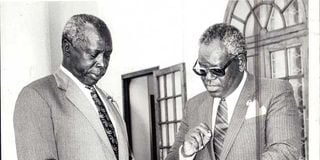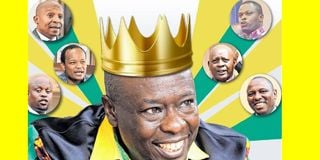Premium
Lessons for Gachagua from Karanja’s fall and why DP should slow down

Then President Daniel arap Moi and his vice-president Dr Josephat Karanja during a past function at State House, Nairobi. Dr Karanja died of cancer on February 28, 1994.
What you need to know:
- In the rough and tumble of the Kanu politics of the 80s, VP Josephat Karanja’s attempts to unite the Gikuyu, Embu and Meru set alarm bells ringing among President Moi’s supporters. Was the VP trying to build a personal power base? Shortly thereafter, came the downfall.
In talking tough, Deputy President Rigathi Gachagua's equivalent would be former President Daniel Moi's vice-president, Dr Josephat Njuguna Karanja.
And because Gachagua is a good literature student, let me take him through the story of Karanja, for there could be a few things he could learn – lest he tumble.
In politics, the road to hell is also part of the infrastructure. It is well-lit and has its champions. So Mr Gachagua needs to slow down.
When Karanja became vice-president, he had only been a member of Parliament for 17 months, having been elected Mathare MP in the October 1986 by-election.
If ever there was a man with hubris, Karanja aptly fit the bill. Despite that, in March 1988, he was picked as vice-president after Moi decided to reconfigure Mount Kenya politics by dropping the highly polished Mwai Kibaki.
It was a surprise pick since Karanja was a greenhorn.
Also Read: President Ruto’s 10 minefields in Mt Kenya
It is the same thing we have heard of "Riggy G”, whose bravado and challenge with political etiquette equals that of Karanja. But, again, Riggy G was not a popular candidate at the UDA party level when Dr William Ruto picked him as a running mate. And this is trap-door number one.
For the past six months, Mr Gachagua has worked hard to build a power base around Mt Kenya in the hope that he could be the fulcrum on which the region's politics rotates.
For starters, a brief on Karanja: He had won the Mathare by-election thanks to a powerbroker named Ndururu Kiboro, a diminutive figure who was the Mathare Kanu sub-branch chairman at the time. Kiboro was a schemer in Mathare politics – and always backed the winning side.
He had previously supported Andrew Ngumba and Munyua Waiyaki before decamping.
To Kiboro, the West African proverb “Only a stupid fly will follow a corpse to the grave” applied to Kanu's cloak-and-dagger politics. Between him and a parliamentary seat was lack of a certificate to show his proficiency in the English language.
The election of Karanja was a farce. Some ballot papers neatly marked for him were discovered. Only nine per cent of the registered voters bothered to vote.
However, Karanja took his new position as MP with gusto.
When critics said he was a “puppet imposed on the voters by an outsider”, Karanja answered that nobody in the race could claim Mathare ancestry. Others thought he was a greenhorn, which is where Gachagua should learn from.
Karanja became the target of the political establishment for his attempt to unite the Gikuyu, Embu, and Meru communities, which, in effect, meant that he was trying to build a personal power base. That, to President Moi and his handlers, set alarm bells ringing.
Also Read: Turf war in Mt Kenya over Ruto succession
When Mwea MP Kathigi Kibugi accused Karanja of causing divisions in Central Province, and said that as a leader, he should unite the people, Cabinet Minister Arthur Magugu, a Nyayo diehard, pushed back: “(Dr Karanja) is not the leader of Central Province. He is not.
The leader of Central Province is the President himself. Therefore, the Vice-President and Minister for Home Affairs have no business with that, and he is not supposed to do that.”

Deputy President Rigathi Gachagua (centre) and other leaders from Mt Kenya region.
Gachagua has been insisting that only UDA loyalists should get state appointments. At one point, Karanja was accused of tribalism and demanding 40 per cent of all vacant slots at the Nairobi City Commission, which ran the city.
Magugu said: “When you see that list, you will find that it is a shame. Yet, here is a gentleman who professes to be a national leader.” Magugu then turned to Karanja and said, “Mr Vice-President, project a national outlook. It is not one tribe that will lead this country to any greater heights … it is Kenyans who will do this.”
And that is something that Gachagua can take home as he defends his continued obsession with likening the Kenyan state to a shareholder company to justify the skewed appointments by the Kenya Kwanza government. It could be only a matter of time before that is used against him.
Gachagua is a well-known tenderpreneur who made millions by working the government tender system – like many politicos. But he should also know that one of the accusations that brought down Karanja was that he had imported three million gunny bags from Bangladesh.
It was said that part of the money came from Uganda and was meant to undermine President Moi.
As corruption scandals emerge in the Kenya Kwanza administration, it is only a matter of time before names of officials brought into the government through him are shown the door.
This week, amidst the Sh3.7 billion Kenya Medical Supplies Authority (Kemsa) mosquito nets scandal, the Principal Secretary for Health, Dr Josephine Mburu, was sent home. More so, the President ordered a shake-up within Kemsa, bringing in Irungu Nyakera as the new chairman with a mandate to clean up the authority.
When he hosted journalists this week, President Ruto seemed to be in a quandary on how to answer questions regarding embarrassing pronouncements by his deputy.
But, of course, the President has also made skewed appointments, and the Church has lamented the rise of tribalism. The only difference is that Gachagua defends the appointments as the direct result of voting patterns.
There is also something that Gachagua can learn from the paddocking of Kibaki to the Mt Kenya region to the extent that he was once chastised as vice-president of Othaya – meaning that he had lost national clout.
Also, he was openly accused of sponsoring candidates in the region, which is about building a power base. The same charge was used on Karanja. Gachagua should learn from these two.
Some politicos argue that had hubris not taken root in Karanja, he would – maybe – have survived the intrigues that led to his resignation on the afternoon of Thursday, April 27, 1989.
But since his fall was scripted elsewhere – part of Moi's desire to shape his survival and organise Mt Kenya politics – Karanja had no chance when piranhas from his backyard were set on him.
So likewise, Gachagua should be wary of potential political piranhas that could be unleashed on him – from whichever quarter. The problem is that he has already shown his tail.
He has shown that he wants more political power and is lining up as a Ruto successor – on political terrain that has Prime Cabinet Secretary Musalia Mudavadi on the waiting list.
Also Read: Inside DP Gachagua's grand power plan
Karanja ignored the rise of Mr Moneybags —Kuria Kanyingi, as a loud-mouthed Nyayo crusader, and with loads of unexplained cash. Mr Kanyingi, as corrupt as he was, targeted churches and women groups with his unending supply of money.
And every weekend, at the state broadcaster, a camera would be spared for him; just in case he had a function. So Gachagua should not be surprised like how Julius Caesar was surprised when he was stabbed by Brutus: "Even You, Brutus!"
With his naivety, Karanja thought that Mr Kanyingi was working at the behest of Magugu. That was mistake number one. As a result, he made the mistake of trying to end Magugu's political career in Githunguri.
On January 25, 1989, he rallied some Kanu officials at the Constituency to pass a vote of no confidence in him. More so, he had organised some heckling during a Magugu rally held on January 29, 1989. Karanja had touched a live wire – since Magugu was no pushover. He fought back, and the person that lost was Karanja.
Karanja’s fall was choreographed from elsewhere and staged in Kiambu, where it was claimed that a ‘kneel-before-me’ politician was undermining President Moi.
The party headquarters reacted swiftly, condemning the unnamed politician. James Njiru, the minister for National Guidance and Political Affairs and Oloo Aringo- the Kanu National Chairman, promised to issue a statement once they received complaints from Kiambu.
In another rally held in Kiambu on March 9, Kanyingi and Limuru MP Samuel Mwaura brought in a Mercedes Benz, registration KZF 645, which had been smashed from behind.
They told the rally there was an assassination attempt on the MP as he returned from Kabarak, Moi's residence. Politics can be dirty and brutal.
Again, the vice president was accused of acting as President when Moi was abroad. President Moi would later say that he had never appointed anyone acting president.
After that, the anti-Karanja bandwagon grew in strength, and in April 1989, he was named in Parliament as the politician ‘fomenting disunity’ – and the rest of the fall followed the Kanu grace-to-grass pattern.
As a result, Karanja’s dream of becoming President vanished quickly. Few people remembered his rise and fall by the time he died of cancer in Nairobi on February 28, 1994.
Dear Mr Gachagua, go slowly. Or as Mugithi singers would say: “slow down teacher, you have come too much”.
[email protected] @johnkamau1





